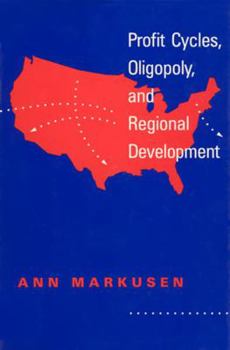Profit Cycles, Oligopoly, and Regional Development
Select Format
Select Condition 
Book Overview
The dramatic shifts in heartland regional economies in the U.S. and other advanced industrial countries have thrown into question the ability of capitalist development to produce permanent growth, economic well being, and balanced regional development. This book develops a theory that radically reconceptualizes the economic forces producing regional change and tests it empirically for a set of fifteen sectors in the U.S. It offers a pioneering approach which should enable planners and managers to better cope with baffling changes in the current economic viability of regions.Traditional theories of regional development have failed to account for innovation and longrun structural change. They have ignored the role of corporate strategy and the existence of market power. Markusen's "profit-cycle theory" provides a key to understanding how, why, and when a region's leading industries undergo major changes. The theory is synthetic, building upon Schumpeterian and Marxist work on innovation and capitalist dynamics, upon the product cycle theories of business economists, and upon theories of oligopolistic behavior. Markusen argues that changing sources of profitability along an industry's evolutionary path will first concentrate and later disperse production geographically, setting in motion a methodically destabilizing process for regional economies.The profit-cycle theory is tested in depth against the steel sector's experience over a century, and against the experiences of sectors in different stages of development, ranging from innovative ones like semiconductors and computers, to mature and troubled sectors like automobiles, textiles, and lumber. The temporal and crosssectional data drawn from the census of manufactures support the theory and its spatial hypotheses. In a final chapter Markusen explores the implications of the research for regional development.Ann Markusen is Assistant Professor, Department of City and Regional Planning, University of California, Berkeley.
Format:Paperback
Language:English
ISBN:0262512203
ISBN13:9780262512206
Release Date:July 2008
Publisher:MIT Press
Length:376 Pages
Weight:1.11 lbs.
Dimensions:0.8" x 6.0" x 9.0"
Age Range:18 years and up
Grade Range:Postsecondary and higher
Customer Reviews
0 rating





